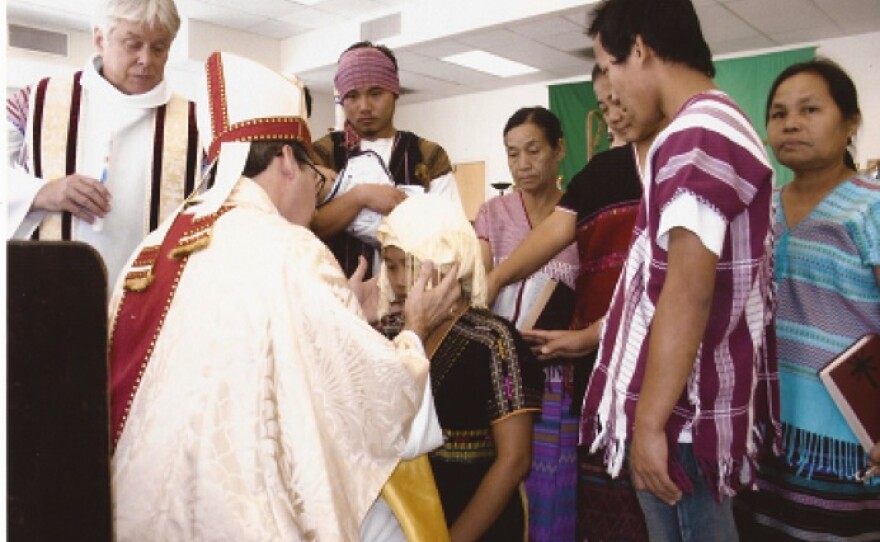A nondescript, slightly rusted lions gate and twelve stained glass windows featuring the Apostles and made out of 7UP bottles and the shards from a broken bowl are some of the only reminders of the original St. Mark’s Episcopal church.

That’s because the City Heights church had to vacate their original property in order to make room for the Urban Village, an eight-block development at Fairmount and University avenues spearheaded by Price Charities to help reduce crime and jumpstart economic growth.
The congregation relocated to 4227 Fairmount Ave., losing furnishings, important documents and archives in the move. But its still going strong. It will celebrates its 100th birthday Saturday.
In preparing for the upcoming centennial celebration, Ministries Coordinator Heather Smith asked parishioners to submit family photos of church events over the past century to showcase how the church has changed. Photos of middle- and working-class families attending baptisms at the original building, a bungalow that held 18 worshippers, and of Burmese refugees participating in youth programs at the new facility illustrate how the church has evolved over the years to serve an ever-changing immigrant community.
Smith said being uprooted helped with the evolution. While the 1998 move from the southeast corner of Fairmount and Wightman avenues could have devastated St. Mark’s, the congregation instead saw a chance to build a more hands-on relationship with the mid-city community it served.
“It was a difficult time for St. Mark’s but I think they saw it as an opportunity to really reconsider what the focus was going to be for St. Mark’s,” Smith said. “Getting the input from the neighbors helped shape the direction they would then go in the future."
That new direction consisted of providing more social services for the community. The church started a tutoring program for refugees, began collecting donations of school supplies and backpacks for neighborhood youth, developed a prostitution recovery program and started opening an interfaith homeless shelter for two weeks each winter.
The new location is multi-purpose, with easily moveable furniture and chairs, rather than pews, to accommodate banquet tables for community dinners or physically disabled parishioners.
The church also has a food pantry and computer lab open to the community on Wednesdays and Thursdays. The pantry was started six years ago as an emergency resource for some of the low-income parishioners who attended the church. It's since grown to become one of the most important social services St. Mark’s offers; the church recently established a partnership with Feeding America and has received grants to supplement the weekly food donations they get from parishioners. According to Smith, the pantry currently serves about 175 to 200 people every month, with the majority of referrals coming from calls received by a local community service hotline.
Smith said the pantry has helped community members in times of need and has inspired many of those who have benefited from the service to give back.
“People who used to be in line receiving the food are now in line serving alongside us,” she said.
While many parishioners have been attending St. Mark’s since before the move, the church’s new focus on social justice and community-building has attracted a different demographic. Outreach work in the community has brought in a more diverse group of people who bring with them new ideas on how the church can serve the community.

Long-time City Heights resident Julie Simons has only recently been introduced to St. Mark’s through a friend but has lived in the mid-city community for 30 years. She says she has witnessed the many demographic changes City Heights has gone through.
“We have a whole wealth of ethnicities that weren’t apart of this community before,” Simons said. “It’s beginning to take on a fabric of its own.”
Now working on hosting a bi-monthly senior lunch at St. Mark’s, she said spirits are high in anticipation of celebrating the centennial - something Smith says is celebratory of not only the anniversary, but of the tenacity of the community.
“St. Mark’s has persevered for 100 years under all the circumstances that has surrounded it,” Smith said. “It is a sign and a testament to the future of City Heights that progress is being made, that there is hope and that there are great things to come.”






